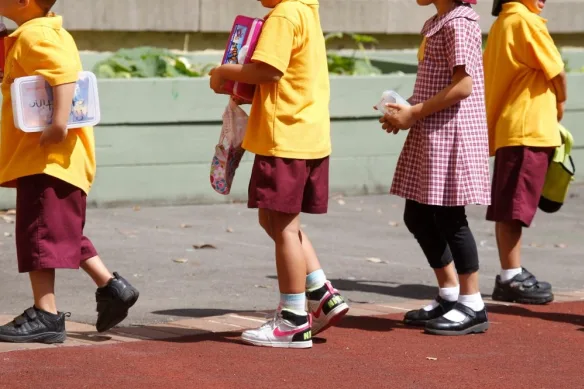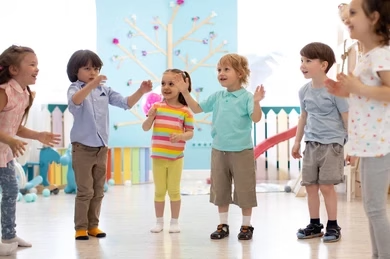
Preparing for a Smooth Return to School for Children Aged 4-8
Introduction
As summer draws to a close and the back-to-school season approaches, parents of children aged 4-8 often find themselves navigating a mix of excitement and anxiety. The shift from the carefree days of summer to the structured environment of school can be challenging for both children and their parents. However, with thoughtful preparation and proactive strategies, families can ease this transition, making it a positive experience for everyone involved. This newsletter explores ways parents can help their children prepare for school, reduce stress, and foster a love of learning.

Understanding the Transition
Returning to school can be a significant change for young children. For many, it may be their first experience in a formal educational setting, while others may be transitioning back after a long break. Children aged 4-8 are at a crucial developmental stage, where they begin to form their identities and social skills. Understanding the emotional landscape of this transition is vital. Common feelings may include excitement, nervousness, or even fear of the unknown. Parents can play a crucial role in helping their children navigate these emotions.
One of the most effective ways to reduce anxiety for both children and parents is to establish a consistent daily routine. Routines provide a sense of security and predictability, which can be comforting for young children. Starting a school-like routine a few weeks before school begins—setting regular bedtimes and wake-up times, as well as designated times for meals and activities—can help children acclimatise. Practicing morning routines, from waking up to getting dressed and having breakfast, can further prepare children for their first day. Incorporating quiet time for reading or relaxing can help them recharge and manage their emotions.

Creating a positive learning environment at home can also help children feel excited about returning to school. Designating a quiet, well-lit area for homework and creative activities can make studying inviting. Providing access to educational materials like books, puzzles, and art supplies encourages exploration and curiosity. Reducing distractions during study time by turning off the TV and limiting screen time can help children focus and develop good study habits.
Returning to school often means re-establishing friendships and meeting new classmates. Social skills are essential for building relationships and feeling comfortable in a school setting. Arranging playdates with classmates or neighbours before school starts helps children reconnect with friends and build new relationships in a relaxed setting. Engaging in role-playing scenarios that involve common social situations—like introducing themselves or sharing toys—can boost their confidence. Encouraging open discussions about feelings related to school allows parents to validate their emotions and share their own experiences.
Establishing a good relationship with your child’s teacher can significantly impact their school experience. Attending open house events or orientation sessions to meet the teacher and familiarize your child with their new classroom is beneficial. Sharing relevant information about your child, such as their interests and strengths, helps the teacher understand and support them better. Regularly checking in with the teacher throughout the school year keeps parents informed about their child’s progress and any challenges they may face.
Promoting independence in young children can help them feel more confident and capable as they return to school. Teaching essential self-care skills, such as dressing themselves and managing their belongings, fosters responsibility. Allowing children to make simple choices, like selecting their outfit or snack, empowers them and builds confidence. Encouraging critical thinking and problem-solving by asking guiding questions instead of immediately stepping in to help can also nurture independence.

Separation anxiety is common among young children, especially during the transition back to school. Gradually introducing short separations from parents, such as leaving them with a trusted caregiver for a few hours, helps them get used to being apart. Discussing expectations about the upcoming school year, including the daily schedule and subjects they will learn, can demystify the school experience and reduce anxiety. It’s important to ask children about their feelings and address any concerns they may have.
Familiarizing oneself with the school’s policies, curriculum, and upcoming events can also alleviate worries. Attending orientation sessions or meet-the-teacher nights provides valuable information and helps parents connect with educators. Encouraging healthy habits, such as balanced eating, regular exercise, and adequate sleep, can significantly impact a child’s mood and ability to focus. Establishing a bedtime routine that promotes relaxation helps children wind down and prepare for a good night’s sleep.
To make learning enjoyable, parents can incorporate fun educational activities into their child’s daily routine. Reading together, playing math games, or exploring science experiments can foster a positive attitude toward school. Helping children set achievable goals for the school year—whether academic or personal—encourages them to think about what they want to learn or improve upon. Celebrating their achievements, no matter how small, builds confidence and motivation.

Maintaining an open line of communication with children is essential. Encouraging them to share their thoughts and feelings about school, while actively listening and validating their emotions, helps them feel supported. Letting them know that it’s okay to feel nervous or excited reassures them that they are not alone.
While preparing children for school is essential, parents must also manage their own stress during this transition. Planning ahead by creating a checklist of items needed for the school year, including supplies and clothing, can help avoid last-minute stress. Staying organized with a family calendar to track important dates, such as school events and parent-teacher conferences, prevents scheduling conflicts and reduces anxiety.

Returning to school can be a significant event for children aged 4-8, filled with both excitement and anxiety. By implementing these strategies, parents can create a supportive environment that eases the transition for their children. Establishing routines, promoting independence, and maintaining open communication are key components in reducing stress for both children and parents. With thoughtful preparation and a positive outlook, the back-to-school experience can be a joyful and enriching time for the entire family. Embrace the new school year with confidence and enthusiasm, knowing that you are setting your child up for success!
Conclusion
Returning to school can be a significant event for children aged 4-8, filled with both excitement and anxiety. By implementing these strategies, parents can create a supportive environment that eases the transition for their children. Establishing routines, promoting independence, and maintaining open communication are key components in reducing stress for both children and parents. With thoughtful preparation and a positive outlook, the back-to-school experience can be a joyful and enriching time for the entire family. Embrace the new school year with confidence and enthusiasm, knowing that you are setting your child up for success!













